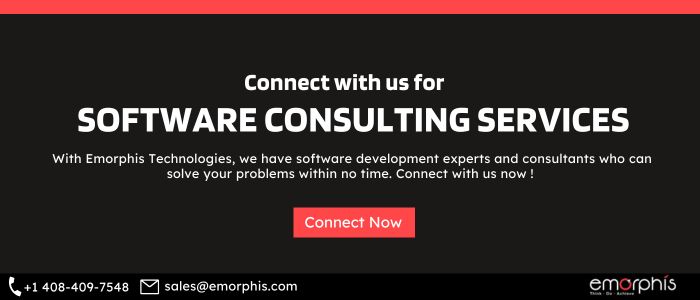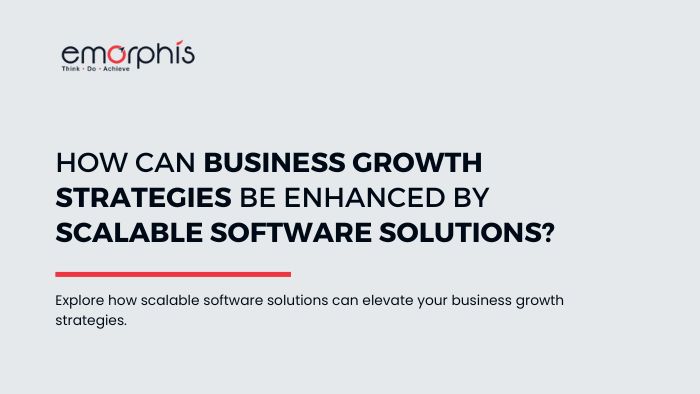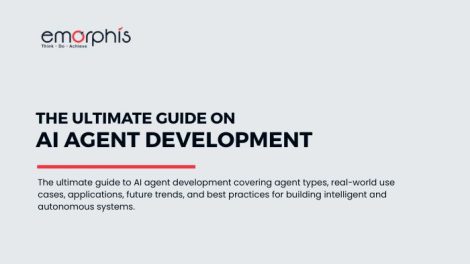Introduction: Software as the Catalyst in Business Growth Strategies
Do you know 80% of businesses that adopted digital solutions have seen a 25% increase in operational efficiency, driving their growth strategies forward, this statistic is from Deloitte. According to McKinsey & Company, companies leveraging data-driven strategies are 23 times more likely to acquire customers, 6 times more likely to retain them, and 19 times more likely to be profitable. In today’s digital landscape, businesses aiming for sustained growth must have the right strategies, backed by scalable technology. Software solutions are no longer just tools—they’re enablers that align operations, drive efficiency, and propel your business growth strategies to new heights.
Whether you're planning long-term or looking for quick wins, incorporating the right software can make all the difference in the success of your business growth strategies.
This article will explore how various software solutions become integral to executing and scaling successful business growth strategies. You’ll find everything you need to build a tech stack that fully supports your growth ambitions.
1. CRM Software - Scaling Customer Relationships as a Core Growth Strategy
Customer relationship management (CRM) software is vital in expanding customer bases and driving engagement—key elements of business growth strategies. When you scale your operations, maintaining personalized communication and understanding customer behavior becomes increasingly challenging. CRM systems like Salesforce, HubSpot, and Zoho CRM are designed to handle this challenge by automating customer interactions, segmenting customer data, and providing deep insights.
Moreover, these tools support your business growth strategies by automating marketing campaigns, tracking sales pipelines, and managing customer support. As your business grows, CRM software ensures that your customer engagement scales seamlessly alongside it. Also, CRM platforms can be customized to fit specific industries, making them versatile components of various growth strategies. By maintaining consistent customer experiences, businesses can foster loyalty, which directly supports long-term growth.
Click the link to check out Salesforce Consulting Services.
2. ERP Systems - Operational Efficiency for Successful Business Growth Strategies
Enterprise resource planning (ERP) systems are essential in aligning and optimizing your operations as your business grows. As a business scales, managing resources, inventory, and supply chains becomes more complex. ERP software like SAP, Oracle NetSuite, and Odoo streamlines these processes by integrating core functions such as finance, procurement, and production into one system.
These tools help execute business growth strategies by providing real-time visibility into operations, enabling better decision-making. Additionally, ERP solutions offer scalability, allowing businesses to add modules or functionalities as they expand. More importantly, they prevent operational bottlenecks, ensuring that growth does not come at the cost of inefficiency. Furthermore, with ERP systems in place, businesses can quickly adapt to changes, manage increased demand, and maintain smooth workflows, all of which are critical to successful business growth strategies.
Click the link to check our Software Consulting Services.
3. Project Management Tools -Staying Agile with Growth-Oriented Strategies
In the dynamic landscape of business growth strategies, agility is key. Project management tools like Asana, Trello, and Monday.com are crucial in keeping teams aligned, organized, and focused on growth objectives. These platforms offer features such as task tracking, timeline management, and collaboration spaces that ensure projects remain on schedule, even as workloads increase.
Moreover, as businesses grow, they often take on larger and more complex projects. Scalable project management software helps manage these projects efficiently by offering customizable workflows, automated task assignments, and comprehensive reporting features. Also, these tools integrate with other business systems, creating a seamless flow of information across departments. This level of integration ensures that your business growth strategies are supported by clear, measurable progress, helping you stay on track and adapt quickly when needed.
4. Data-Driven Business Growth Strategies - Scalable Analytics and Reporting Solutions
Data is the backbone of modern business growth strategies. To make informed decisions, businesses need access to real-time analytics that provide insights into performance, customer behavior, and market trends. Scalable analytics platforms like Google Analytics, Tableau, and Power BI enable businesses to process large volumes of data and generate meaningful reports.
These solutions support business growth strategies by identifying areas for improvement, highlighting growth opportunities, and tracking the effectiveness of initiatives. Moreover, as your business scales, these platforms offer the flexibility to handle increased data flows and more complex reporting needs. Furthermore, integrating analytics with your CRM, ERP, and marketing tools allows for a holistic view of your operations, ensuring that every aspect of your growth strategy is data-informed. This data-driven approach is crucial for maintaining a competitive edge as you grow.

5. Financial Management Software - Profit-Driven Business Growth Strategies
Financial stability is crucial when scaling your business. As your company grows, managing financial operations becomes increasingly complex, making robust financial management software essential. Tools like QuickBooks, Xero, and Sage Intacct are designed to manage everything from accounting and budgeting to financial forecasting and reporting.
When it comes to business growth strategies, financial management software supports your ability to scale profitably by offering real-time financial insights, helping you maintain cash flow, and ensuring compliance with regulations. Moreover, these tools automate routine financial tasks, freeing up resources to focus on strategic initiatives. Also, financial management solutions are scalable, allowing businesses to add more features and integrations as they grow. This adaptability ensures that your financial operations remain aligned with your business growth strategies, minimizing the risk of overspending or poor resource allocation.
Furthermore, integrating financial software with other business tools—like ERP systems—provides a comprehensive view of your finances, operations, and growth trajectory. With a solid financial foundation, businesses can confidently pursue expansion, invest in new opportunities, and sustain long-term growth.
Click the link to find details on Fintech App Development.
6. Marketing Automation Platforms - Scaling Marketing Efforts in Growth Strategies
A key aspect of business growth strategies is attracting and retaining customers at scale. As your business expands, manual marketing efforts become less feasible, and that’s where marketing automation platforms like HubSpot, Marketo, and ActiveCampaign come into play. These tools automate everything from email marketing and social media campaigns to lead nurturing and customer segmentation, ensuring consistent and effective communication with your audience.
Moreover, marketing automation platforms enable businesses to execute growth strategies by streamlining the customer acquisition process. They also provide in-depth analytics on campaign performance, allowing you to tweak your strategies for better results. As your customer base grows, these platforms offer scalability by managing more leads, increasing campaign complexity, and expanding marketing channels without requiring additional resources. Furthermore, they integrate seamlessly with CRM systems, ensuring that marketing efforts are aligned with broader business growth strategies and that customer engagement is optimized across every stage of the buyer’s journey.
Additionally, marketing automation tools support personalized content delivery at scale, enhancing customer experience and driving conversions. By leveraging these scalable solutions, businesses can maintain a competitive edge in increasingly crowded markets, ensuring that growth is both efficient and sustainable.

8. Cloud-Based Infrastructure - The Backbone of Scalable Business Growth Strategies
Cloud computing is a game-changer when it comes to scalable business growth strategies. Platforms like Amazon Web Services (AWS), Microsoft Azure, and Google Cloud provide the flexibility and scalability that businesses need to handle increased workloads, store large volumes of data, and support growing application demands. By migrating to the cloud, businesses can scale up (or down) their infrastructure on demand, ensuring that they only pay for the resources they use.
Moreover, cloud-based infrastructure supports business growth strategies by enabling rapid deployment of applications, reducing operational costs, and improving business continuity. It also allows for seamless integration with other software tools, creating a unified tech ecosystem that grows alongside your business. Furthermore, cloud solutions offer enhanced security features, data recovery options, and compliance support, all of which are critical as your business scales.
Also, cloud platforms provide global reach, allowing businesses to expand into new markets without needing to build physical data centers. This flexibility is key to executing growth strategies that involve geographical expansion, product diversification, or digital transformation. By leveraging cloud-based infrastructure, businesses can achieve the agility and scalability needed for long-term success.
Click the link to find details on Cloud Computing Services.
9. Security and Compliance Software - Safeguarding Your Business Growth Strategies
As your business scales, ensuring security and regulatory compliance becomes increasingly crucial. With growth comes the risk of more significant security threats and stricter compliance requirements. Tools like McAfee, Symantec, and OneTrust help businesses safeguard sensitive data, protect against cyberattacks, and maintain compliance with industry regulations.
Moreover, security and compliance software integrate seamlessly with your existing systems, providing real-time monitoring, threat detection, and automated reporting. As part of your business growth strategies, implementing robust security measures ensures that scaling does not expose your business to unnecessary risks. Also, compliance software helps manage regulatory changes as your business expands into new markets or industries.
Furthermore, these solutions offer scalability, allowing businesses to extend their security and compliance coverage as their operations grow. This proactive approach helps maintain customer trust, avoids costly fines, and protects your reputation—key factors that are essential for executing business growth strategies effectively.
10. AI and Automation Tools - Accelerating Business Growth Strategies with Innovation
Artificial intelligence (AI) and automation are transforming how businesses approach growth strategies. From automating routine tasks to providing predictive analytics, AI-driven tools like UiPath, Automation Anywhere, and IBM Watson help businesses scale operations more efficiently and intelligently.
These technologies support business growth strategies by enhancing productivity, reducing operational costs, and enabling faster decision-making. Moreover, AI and automation tools offer scalability, allowing businesses to automate more complex processes as they grow. Also, AI-driven insights can be applied to everything from marketing and sales to supply chain optimization, driving more effective growth strategies.
Click the link to find details on AI Software Development.
Furthermore, integrating AI into your business systems allows for smarter data analysis, personalized customer experiences, and automated workflows that free up human resources for strategic tasks. By leveraging AI and automation, businesses can stay ahead of the competition and execute growth strategies that are both innovative and scalable.
Conclusion
In today’s competitive landscape, the success of your business growth strategies depends on how well you integrate scalable software solutions into your operations. By carefully selecting tools that align with your growth objectives, you can ensure that your business is prepared to handle increased demand, improve operational efficiency, and seize new opportunities.
Moreover, whether you’re focusing on strategic planning, customer engagement, financial management, or operational efficiency, the right software can be a powerful enabler of growth. Also, by adopting solutions that are flexible, data-driven, and scalable, you create a foundation that supports continuous innovation and adaptation—key ingredients for sustained business growth.

Remember, as you build your software stack, consider future scalability, seamless integration, and alignment with your overall business growth strategies. With the right technology in place, your business can confidently navigate the complexities of growth and unlock its full potential.
Ready to power your business growth with cutting-edge software solutions? Emorphis Technologies specializes in delivering scalable software tailored to drive your business growth strategies. Our team of experts is dedicated to providing innovative solutions that adapt to your evolving needs, ensuring efficiency and long-term success.
Connect with us to discover how our customized software can fuel your growth, streamline operations, and enhance your competitive edge. Let Emorphis Technologies be your partner in achieving ambitious growth goals and transforming your business strategy.







